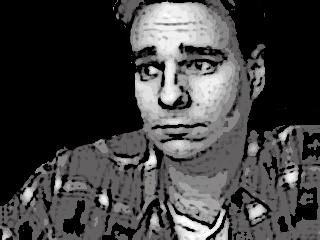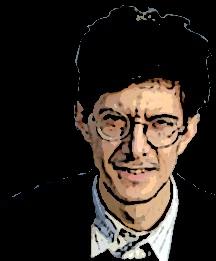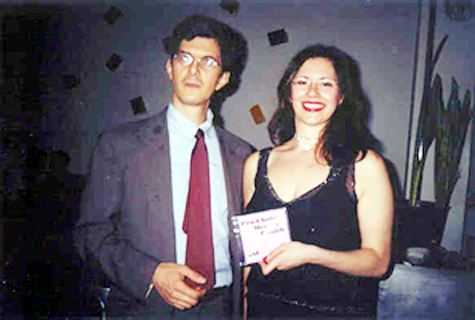|
I
met Peter Dizozza in the Summer of 2002. Steve
Espinola
invited me to the Biff
Rose's
annual film festival, which I entered one of my student films to
show. One of the presenters brought a 16mm projector, and since I
was a projectionist throughout college, I would occasionally ask him
questions about the projector, or tell him about something or other.
I also helped set up the screen. We talked a bit, nothing big. This
person was Peter Dizozza.
One
of his films from the 70's was shown, where he took a B-movie and
intercut images that conflicted with the story for humorous or
thought-provoking effect using found footage. I talked to Peter
about the acquisition of such footage, and about current
online places to get great public domain film for free.
Later on, my college film/documentary about relationships gone wrong
was shown, with great approval by the crowd. One of the supporters
of that film was Peter Dizozza.
When
I started writing about Anti-Folk and interviewing several of the
artists on the scene, I would always send links to other artists
to review. I would scour Antifolkonline.com
to learn more about other people that I haven't yet listened to. One
of the albums I had yet to listen to was Pro-Choice
on Mental Health.
The person who sent me that album was Peter Dizozza.
What
was interesting to me was how Peter sits in the scene, and yet is
different than many of the performers inhabiting Anti-Folk.. While
Anti-Folk is multidimensional, and can't be defined by a single line
description (i.e. "Acoustic Guitars with fuzz boxes" or
"Ballads with self-deprecation") there is a common thread
in the spirit. Many of the Anti-Folk stars have performed in his
song cycles/musicals/performance pieces, and yet his piano style is
very typical to a pop sensibility.
Peter
and I are talking on the phone. We start off talking about the
packaging of the album, and how the cover seemed to be inspired by
Valley of the Dolls.
Krisbee:
Its definitely medicinal; it looks like something that would be on a
drug label. I don't know if it's the font or the falsely soothing
pink.
Peter
Dizozza: Yes... especially for men that's falsely soothing. It could
also be (classified) under self-help, besides music or spoken word.
Krisbee:
It definitely explores different ways of thinking about... well for
you it was generalized anxiety disorder?
Peter
Dizozza: (surprised tone) Yes...
Krisbee:
I never had generalized anxiety disorder, but I have had panic
disorder.
Peter
Dizozza: Oh, I wonder what's the difference?
Krisbee:
Well, panic disorder is irrational, and happens on no particular
basic thought, opposed to anxiety, which is based on paranoia.
Pro-Choice
on Mental Health is a meditation on a theme within a story.
It starts off with our protagonist, who we can assume is Peter,
being recommended by his doctor to feign insanity so he can go away
for awhile, while reaping the benefits of his federal health
insurance before they run out. While in the institution, he falls in
love with one of the patients, and when his time at the institution
was to end, he is deemed unstable; if he were stable he wouldn't
have fallen in love with a clearly insane person.
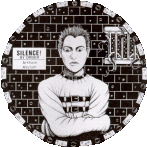
The
story line progression gets thinner as we progress, but each song is
transitioned to the next with Peter talking either about something
that relates one song to the next, or an advancement of the plot is
made.
We discuss Peter's thoughts on depression.
Peter
Dizozza: The CD might say if you had a reason for that (depression),
was it a chemical imbalance or was there somewhere deep inside you
that caused this response, something that you thought was worthy of
this response.
Krisbee:
I think it is a little from column a and b. I think everything in
your life affects you somehow; there were underlying events that
triggered it (your mood), but you might be predisposed because of
your chemical make-up.
Peter
Dizozza: The hope of the CD is that you can make that choice, and
maybe that is a dream, but that maybe the reason you are depressed
is not because of a chemical imbalance, but really there is
something that we can change, and we are reacting to it; the source
of the depression, like a job.
There
is the cliché that in any art that one creates, regardless of
topic, that hidden in the subtext of the story will be a window into
your own psyche, your soul, your subconscious. Peter writes stories
with the music tied into them, whether it is about dueling
pianists moving to Hawaii,
or about a trucker and a satellite. Within those diverse stories are
topics that Peter feels a need to explore.
Krisbee:
When you wrote the songs for the album, what was happening in your
life?
Peter
Dizozza: I was finding that a couple of people were unpredictable,
some of my friends that were taking medication would be reacting one
way, and then change completely, and I felt that somewhere in the
back of my mind I was as depressed as they were but I wasn't using
medication to help it.
Krisbee:
What medications were they on?
Peter
Dizozza: I remember one friend was on Prozac.
Krisbee:
They were having mood-swings?
Peter
Dizozza: Yeah, they were getting a lot of attention. It
seemed to be a time consuming search to improve ones mood, and I
guess I was coming from a deep seated feeling that to feel depressed
is a valid response to looking at things the way they are.
Krisbee:
It's a very complex issue, which is why you dedicated an album to
it. There are lots of viewpoints, and they could all be correct all
at the same time. Chemically we are being affected, and we feel
depressed, but at the same time suppose three of our friends just
died. We don't think about it, but our body does.
Peter
Dizozza: Right... "Oh, by the way three of your friends died,
so it caused you to have a mood swing."
Krisbee:
...and its' something you just don't reflect on.
Peter
Dizozza: That's why I like the talking cure, so to speak, because we
so often coexist with things prominent in our mind that we don't
remember.
Krisbee:
I have that problem, that I don't remember anything bad, but of
course I must.
Peter
Dizozza: Things could have happened recently, but you are not
conscious of them, but they are manifesting in moods. I'm going
through another experience now with finding a perfect relationship,
and being confronted with the idea of being happy with someone, when
all this time I didn't think it was possible to meet that special
someone. I create, therefore, another type of anxiety for myself.
One
of the things brought up in a monologue is the phenomena, especially
in the earlier part of the 20th century, of going away for months at
a time to health camps to rejuvenate one's constitution.
Peter
Dizozza: Yeah, I love the idea, and it's kind of dream to get away
for awhile, but it never happens! You go somewhere, and you are in a
new story; the three people there are as consuming... and to be
alone, and go up to Maine like Jeff
Lewis
does, we end up filling up the space.
Krisbee:
Sure, just like Fellini's
8 1/2,
where the director goes away to get better, and his girlfriends and
his wife come and visit, and everything he was trying to escape
comes to haunt and terrorize him.
Peter
Dizozza: That's an interesting joy though, to see that movie, you
almost wish you could be that character... I relate to that.
Krisbee:
Sure it's all falling apart, but I want to be in that circus.
Analyzing
the lyrics, I realize that there are quite complex themes going on
within the songs, often encapsulated in short bursts. The song
Beached has a line that alludes to the fact of the moon affecting
tides, and the theory that the moon also affects our moods by
pulling on the fluids within our bodies, making it's own ebb and
flow; this can be related to astrology or biorhythms. With this
theory, it explains the phenomena of more odd crimes happening
around the full moon in the lunar cycle. It also explains the
cyclical nature of mood swings.
Peter
Dizozza: Certainly a lot of women feel that experience. Also, there
was a full moon the last few days. It's a dream, or a romantic wish,
because I wouldn't be aggressive to someone that I was attracted to;
this women I'm with, we'd come together because of a third stimulus,
not the two of us, but rather the tide. That was a dream; instead of
me being the reason of causing something physical, or physical
contact, but having the moon do it. It's not that unusual, a lot of
stories attribute things to the moon.
Krisbee: Out of all the songs, the one I don't understand it the Wall Flour. Peter Dizozza: Maybe it's about doing something crazy, rather than acting on strategizing and thought, just bursting out and leaving for other people to worry about what that means, and what to do with the mess. It can be a disruptive song; I have mixed feelings about it.
Krisbee:
In the beginning it starts off chatting up a member of the opposite
sex.
Peter Dizozza: Yes, that we are going to get into contact. Because they are touching each other, he's not actually aroused by the touching, but by a discussion that might lead towards the need for contact; like, take a rest from all of this intellectualizing.
Krisbee:
But actually it's not, it's sort of supporting the
intellectualizing. In the song it seems that they are so in love
with their discussion so much that they have to sleep together; that
they are in love with the knowledge that they are sharing with each
other.
Peter
Dizozza: It's a visceral song. I don't know how to describe the
connection with the shotgun and breaking through the walls. There
are some lines about the demons trapped where they lurk, there is a
sadistic pleasure of looking at them... what did you think of the
song, did it have any meaning for you?
Krisbee:
It has so much going on it, I'm having trouble deciphering it, which
is good; that's when I think you are on to something. There are a
couple different things going on at the same time, and I haven't
figured it out yet.
Peter
Dizozza: Yeah, or if it stimulates something in you, to get your own
thoughts freed into something that more directly affects you.
Krisbee:
It has the contrast of the two lovers, then it gets into something
more aggressive in the song, it's almost like the topic of the song
doesn't mean as much as the emotions conveyed within the song.
Peter
Dizozza: I think there is some male element going on as well. The
orgasm is a dangerous experience for other people, like a shotgun.
That would be a way for people to clear their heads; the couple
makes love, they leave a mess and walk away, but they are free.
Krisbee:
My favorite song on the album is Home Inn Time. You have such a love
of learning, and I think that comes through very well in this song.
It's a love letter to books, which is something I don't know if
anybody else has ever written about.
Peter
Dizozza: I was in Exeter, England, in this library where you can
stay late; in a college library usually people will stay late
because of exams, and it was just a happy place to be... the idea
that you can become anonymous because you are far away in your
thoughts.
Krisbee:
Maybe its' also a place where you can be something you are not.
Peter
Dizozza: Sure. Grow through reading, and live somebody else's
experience through art or writing. A lot of times we form our own
personalities through what we read, what we see in the movies. I
think I have benefited from that. Sometimes I feel alone if that is
the only way I have developed; through books, music, or movies. But
yet those things are very instrumental in developing the way that I
am... how do you feel about that?
Krisbee:
I was just thinking, because you were talking earlier about you
being in a stronger relationship than typical for you, that in my
own relationship what finally clicked to me that she was the one,
which you think with almost every relationship, was the frame of
reference in books and movies we shared; I could say half of an
obscure line from a movie, and she could finish it. That cemented
everything to me.
Peter
Dizozza: That's a good thing, that the work can become a vehicle for
you to get to know each other; you have a familiarity with
something, and that becomes your common ground.
Peter
asks me about other songs on the album. I mention Let Me Be, that I
like the melody, the lyrics, its' purpose either in or out of the
context of the story. I enjoy the allusion of a jockey riding a
horse, and how that image twists into a description of a masochistic
relationship.
Peter
Dizozza: It was a relationship where I couldn't imagine getting out
of it; it was dangerous. The relationship that followed that one,
the person would commit herself regularly like it was a vacation.
Peter
has intrigued me so much because he has such diverse activities
filling his day. Besides being a full-time lawyer, he is a novelist,
a musician, a musical director, a filmmaker, performer... he is
involved in so many projects that I am overwhelmed just reading
about them on his website. Looking at all of the creative endeavors
he is a part of, I wondered whether being an artist is his true
love, with his career in law being a drudgery and a necessary evil.
According to Peter, he likes being a lawyer because it is a
different story everyday. He said he finds it hard to enjoy leisure
time; he always wants to move to the next step, which would explain
the multi-tasking nature of the projects he assigns to himself. He
also says that he likes the surprises that life gives him, good or
bad.
Peter
Dizozza: That's what keeps me going, when unusual things happen.
(topic change) The world is progressing very quickly, and technology
is, too. People are interacting with each other; there is much more
universal awareness of each other, maybe a greater tolerance and
understanding.
Krisbee:
Don't you find, maybe just as Americans, that we are more afraid of
each other?
Peter
Dizozza: I hope not. Amidst all this gloom and doom type of thing
that people are becoming less threatening to each other. When I grew
up, I was in the city, and it was a threatening environment, and it
is less threatening now. There's awareness of people around me, and
I don't feel threatened by them any more than they should feel
threatened by me.
Krisbee:
You enjoy writing about problems you have whether they get resolved
or not?
Peter
Dizozza: Yeah. I am looking at the song No Problem There right now,
and I didn't really understand what was going on with the person, or
have even gotten beyond it except that I have written a song about
it. She's was sleeping with someone else while she was involved with
me, but she wasn't really involved with me. The way she was living
her life, it appeared that she was able to help me and help herself,
but ultimately she was involved in her own path and that didn't
include me at some point. The greatest growth is to be comfortable
with that, and treasure the time we had together, and treasure her
in some way. It's a little nasty song, somewhat, but it is some sort
of a riddle.
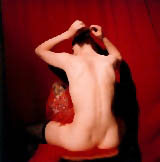
Peter
asks me what I think about the monologue/story after the song cycle
on the CD about the person that he helped secure money for by using
the legal system; getting disability money because he was a heroin
addict. At the end of the story, the person buys heroin with
that money and dies.
Krisbee:
I was intrigued that you didn't seem to have a moral stance on the
entire issue.
Peter
Dizozza: Did you have a stance on the issue?
Krisbee:
That's a good point.... I would feel bad that he died, but I
wouldn't feel responsible that it was money I helped him in
securing.
Peter
Dizozza: That was the first time I told anybody about that... it was
on my mind for a long time, but that wasn't a prepared monologue;
that's just me telling Joe (Bendik) what happened. Did you think it
was a good thing to have on the record?
Krisbee:
Yes... it was definitely brave. Especially since it was such a
morally ambiguous tale; there is no real winner or loser in the
story, which I guess is the case in those situations.
Peter
Dizozza: Yeah, but it might be up to me to find something like that,
and I haven't. I'm just throwing it out there.
Krisbee:
Looking back on it now, do you look at it like a predetermined fate?
Peter
Dizozza: No, to me it shows me wrapped up in my own life. You could
make an effort, and I did not make any effort.

Krisbee:
Was it for you to make an effort?
Peter
Dizozza: Well that's the question. It's a choice, and you think our
lives are so busy that we can't help anybody else, but another part
of me says that it doesn't matter one way or the other; if I did
help him and save him, it's a big uplifting story... but it's not
really a big uplifting story (no matter what the outcome).
No
answers are given in the song cycle like real life, only questions.
Peter
Dizozza: I look at doing my work as a part of the responsibility of
it is to make it available for people, either to like it or not;
dismiss it, or make it a part of their lives. That's where I am at
now; to do something outrageous enough so it is worth an audiences
time to consider, and something that they are not going to get
anywhere else.
Krisbee:
Do you try to make your pieces accessible?
Peter
Dizozza: I make them accessible in the sense that I will make the CD
and send it to places, and just leave it at that. Then make another
CD, try different a sound, work with different people, because they
contribute a lot. Joe
Bendik
really contributed with the sound and style; things that I liked, he
could just do naturally. I'm working with
Major Matt Mason, and his strengths are in different areas as well, so it is a different sound (than this album). Different songs too, new and fun songs. It will be a nice library for people who connect with the material.
Peter
notices that ideas and things in his life are becoming clutter
around him. However...
Peter
Dizozza: Pro-Choice on Mental Health is not clutter; it's the
package, it's done, it's separate, I don't have to go back to it. I
am behind on doing that; all those things that are clutter are
things left unpackaged. I need to put them in a package, and put
them out. I'm hopeful that I have something distinctive to
offer to people because there is so much out there. I hope
the ideas are unique, fun and helpful, and that they serve as a
source of further inspiration for others.
Studying
Peter's
website,
I am so impressed by the packaging of his work. He has
detailed notes, reviews, pictures, timelines, and more dedicated to
projects that he has involved himself in over the years. I
can't even get myself to put pictures away in an album.
Reflecting
on the topic of the CD, I am remembering that my therapist has told
me that most depression is chemical, and our moods are heavily
affected by what we injest, what our internal hormonal system is
doing. However, I am also inclined to belived that modern life
creates these problems. Nobody had bad backs in the 1800's...
With so much time to focus on yourself, you are bound to find
something wrong.
Would
Peter have anxiety if he wasn't living in New York, in the village?
Would he have had the same thought process if he were a lumberjack
in the Ozarks? Is your mental health failings an essential
part of your personality, and devoid of your flaws, would you be a
person at all? Peter has said that he hopes that you have a
choice in the outcome of your mental health, but I wonder if it is
your surroundings that create your defects. The idea that your
disposition can be changed may directly relate to your surroundings
and your position; if you hate your abusive landlord, move. If
you want another job, position yourself into another one. Was
that what that fucking REM song, Stand, meant? Probably not.
|





